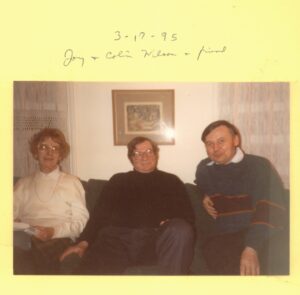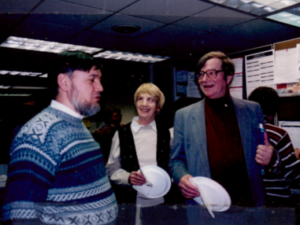
Joy and Colin and me, March 17, 1995
As I said in a previous post, Colin Wilson provided invisible companionship during long years from 1970 through the 25 years before we met. What he did for me, he must have done for uncounted thousands. But how to give even the faintest idea of his importance to my life?
Let’s look at part of John Ezard’s December, 2013, obituary in the Guardian, with a few comments by me, inserted in brackets.
The headline said:
Britain’s first homegrown existentialist star, he had a huge success with his 1956 book, The Outsider
[The obit began:]
For a few dazzling months, Colin Wilson, who has died aged 82, was taken at his own valuation in his diary as “the major literary genius of our century”, a writer destined to be “Plato’s ideal sage and king”. The phenomenal reviews and sales of his first book, The Outsider (1956), led him to be seen as a potential saviour of the human spirit, a thinker who might find a way through the spiritual nullity of the postwar years.
The book remains extraordinary, more for its reach than its grasp.
[The author doesn’t mean this as praise, but one might almost say that he here describes Colin’s strength, as I will try to show.]
It was an attempt to map a single, negotiable path of mysticism from the span of recent western art and philosophy. Wilson looked for the path through case studies of the agonies and ecstasies of thinkers, artists and men of action including Friedrich Nietzsche, Jean-Paul Sartre, Albert Camus, Ernest Hemingway, Vaslav Nijinsky, Vincent van Gogh, Hermann Hesse and Lawrence of Arabia. He condensed them into a single type, “the Outsider”, a questing spirit straddled between devastating experiences of nothingness and moments of the highest insight.
[This is a vastly over-simplified sketch of a complex scheme which sees not one type of outsider, but three, a la Gurdjieff. And it doesn’t even hint that Colin was arguing that the West was suffering a crisis of belief, of which outsiders were an initial symptom.]
“Our life in modern society is a repetition of Van Gogh’s problem,” Wilson said, “the day-to-day struggle for intensity that disappears overnight, interrupted by human triviality and endless pettiness.” The book was excitingly written, with a sense of revelation. The failing, which took longer to emerge, was that it oversimplified and deformed some case studies to make them fit a thesis.
[No, I think the major failing was the same as its major strength: I tell my friends, his value to you probably won’t be in the conclusions that he draws, but in the connections he leads you to make. His explorations were so wide-ranging as to stun you with a sense of how much you didn’t know, how many things you had thought of only in isolation.]
A review in the London Evening News was headlined “A major writer – and he’s 24”. Philip Toynbee, of the Observer, called it “exhaustive, luminously intelligent”. Other critics followed suit. The book gave Wilson a celebrity and a status close to that of a prophet, even in tabloid newspapers. That was in 1956 – “how extraordinary my fame should coincide with Elvis Presley’s,” he noted. The Outsider sold more than 20,000 copies in its first two months.
His passionate inquiry into his themes continued but critics deserted him. He went out of fashion and – though he published more than 100 works – he survived financially only because many of those dealt with murder or the occult as pathways to the insights that fascinated him. His readership grew to include murder buffs, UFO spotters and new age believers. Typical of this later output was Alien Dawn (1998), marketed with the line “the evidence is overwhelming – they are here”. Serialised in the Daily Mail, it undoubtedly made more money than any of his philosophical books.
[It would be more accurate to say that Colin was not to be deterred by literary or scholastic fads. Unlike the critics and “scholars” who make sure to jump on whatever the latest bandwagon, he maintained his focus. That focus led him into all sorts of byways, many of them “disreputable” according to the official definers of culture; Colin couldn’t care less. He went his own way.]
Wilson, who was based for more than 50 years in Gorran Haven, Cornwall, bore his literary disappointments gracefully. He remained sure that he would triumphantly find and remove the psychic impediment which, he thought, had blocked all human creativity in his time. It was by no means an ignoble cause, as the praise for his early work showed. He was greatly gifted. Almost entirely self-educated, he had huge mental energy, read prodigiously and explored the worldwide resources of literature, philosophy and science with earnestness. His role model from the age of 13 was George Bernard Shaw, also self-taught.
Wilson’s defects – enough to undo him as a thinker – were an imperfect analytical ability and a protective conceit that left him virtually impervious to the rational or intuitive arguments of others.
[Again, I think this misreads what he was doing and how he was doing it. What the scholars and critics seem unwilling to grasp is that Colin was not playing by their rules. He wasn’t carefully hedging his arguments so that he might get tenure, or so that he wouldn’t jeopardize his status as “respectable” journalist. He was lighting fires! He was shining searchlights in the darkness. He wasn’t playing literary games, he was trying to help people wake up.]
Yet the literary establishment’s handling of his first books remains one of the more memorable intellectual disgraces of our time. He said, “I would like my life to be a lesson in how to stand alone and to thrive on it.”
[Hemingway had the same problem, for the same reasons,]
…
The key to the collapse of the Wilson phenomenon was perhaps that philosophy and religion ceased to be seen as mainstream topics after the 1950s. His promise failed as much for lack of a challenging or nourishing climate as for any other reason.
[In other words, he didn’t trim to follow the fads; he did his work as it came to him.]
Wilson summarised The Outsider and its sequels in his 1966 book Introduction to the New Existentialism. He was Britain’s first, and so far last, homegrown existentialist star. His later books tended more and more to go to niche readerships, though he said The Occult (1971) earned him £100,000. Dreaming to Some Purpose, a memoir, appeared in 2004. In Super Consciousness (2009), he focused on “peak experiences” or states of heightened awareness, a concept explored by the American psychologist Abraham Maslow.
He and Joy were able to offer (carefully vetted) guests smoked salmon and fine wine in their Cornwall hermitage, its rooms and sheds groaning with 30,000 books and 10,000 classical and jazz records.
[Bob Friedman and I were privileged to visit them in 2001 and stay the night, a memory that remains warm.]
Wilson, still an unstoppably wide-ranging and oracular conversationalist, grew into a kind, mostly serene man. “The critics tried to take back what they’d written,” he said. “They couldn’t take back the passport they’d given me.”
[Thank God. That initial huge impact gave him the ability to find publishers year after year, in subject after subject, and we are all the better for it. And, kind? Oh yes. He sent me several unknown authors that he thought might interest me as they had interested him.]

On their visit to the Hampton Roads office, 1998
I never dreamed in 1970 that one day I would publish books by Colin Wilson! But, we did. The Books in my Life, the Spiderworld series of four novels, Rogue Messiahs.
A wonderful man. A lifesaver, a bearer of light in a dark time.